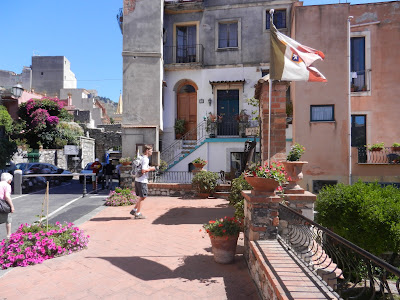We go through the Strait of Messina during the night, presumably passing the Island of Stromboli, a sparking volcanic cone. We didn’t get up at 3 am to see it, but a few people did. Some say they saw sparks, others say they didn’t.
We have an early departure, at 7:30, for the tour to Taormina. After going through 36 tunnels, we arrive at this charming town on the edge of the sea. Do see the pictures or google it! It's spectacular!
We walk to the Greek/Roman amphitheater, a structure that at one point could seat 5000, and learn the differences between how the Greeks used theater and how the Romans used the space for gladiator fights and spectacle.
We walk to the Greek/Roman amphitheater, a structure that at one point could seat 5000, and learn the differences between how the Greeks used theater and how the Romans used the space for gladiator fights and spectacle.
Ancient Greece was a democracy and required an educated citizenry and at least its voters - free men - needed to be educated. Every man who was not a slave had a single vote. The theater provided that education. Comedy, tragedy, it all was used to educate its citizens. Women seemed to have been allowed, but I don't recall where their seats were. The era of Greek dominance was approximately from the 7th century to about 150 bc. Romans took over but were significantly “hellenized,” that is "Greek-ified."
Rome, on the other hand, ruled by brute force. It amended the ancient Greek theaters to use them for gladiator fights and the persecution of people it deemed worthy of death. Also an education, the example shown was a fight to the death. Apparently, the gladiators always began as slaves, but those who continued to win their fights could work their way out of slavery. Of course those cases were rare.
We were originally scheduled to travel the 270 miles to Ithaca, Greece after departing at noon, but around that time we learn from the cruise director that all Greece is going on a two-day strike so we can neither stop at the island of Ithaca nor make our way through the Corinthian Canal. Instead, we will sail 500 miles around the Peloponnese and arrive in Athens about 3 am on Wednesday, with disembarkation later in the morning. We’re heading full speed to make that destination, and rocking and rolling a lot in the process. Winds come from the north in this part of the Ionian Sea, and we are heading roughly west-to-east, so we roll with the swells.
At every port, a local person boards our ship and performs the role of pilot. We learn that the pilot never actually touches the controls on our boat, but guides our captain into and out of the harbors. The two boats don't seem to even slow down for the step from his boat onto ours (docking), nor to slow again when he leaves our boat once we clear the harbor on departures. Below is a video of one of those events:
Though not our last night at sea, we still have the Captain’s dinner tonight. The original reason for the earlier special dinner was that the captain would be required for our trip through the canal at Corinth, but the lobster has already been purchased for tonight so we celebrate now, even though we will miss the canal.



No comments:
Post a Comment